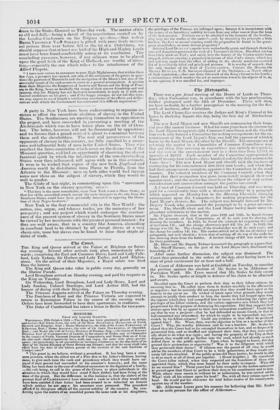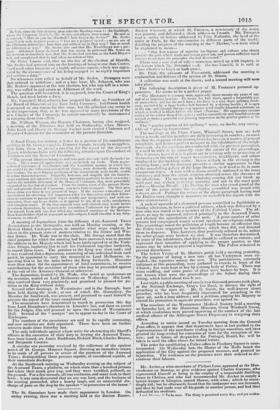Cr...rbc gietraptai#.
There was a pro Aria meeting of the House of Lords on Thurs- day ; when Parliament was, in accordance with the late proclamation, further prorogued until the 12th of December. There will then, we have no doubt, be a further prorogation to the meeting for the des- patch of business, after Christmas.
The Lord Chancellor receives the Judges and King's Counsel at his house in Berkeley Square this day, being the first day of Michaelmas Term.
The new Lord Mayor and new Sheriffs are commencing their finan- cial year like men of business. It had for some years been the custom for the Lord Mayor to appoint eight Common Councilmen, surd the Sheriffs four each, who formed a Committee for making arrangements for the en- tertainment of the Lord Mayor's Day, cue half the expense of which is borne by the Lord Mayor, the other by the Sheriffs. The consequence of referring the matter to a Committee of Common Councilmen was, that any thing like economy in expenditure was entirely diregarried; and the vest of the entertaintnent rose in a short time trout Leete. to upwards et 3,000L Each member of the Committee approprieted to himself twenty-four tickets—three hundred and eighty-four amongst the Corn ! The new Lord Mayor -and Sheriffs took the business of centime big for the entertaintnent into their own htinds ; and when they had their arrangements complete, appointed the Committee in the usual manner. The selected members of the Common Council, when they found that their occupation was gone, immediately resigned their new appointment ; and the matter has since been the subject of very serious consideration and conversation stmongst the parties concerned.
.A Court of Common Council was .held on Thursday, and was occu- pied for a considerable time with it discussion relative to a paragraph w.hiell appeared on Monday last in the .211(».aing Chronicle, charging extravagance upon the Committees for making preparations for the Lord Mayor's dinners, &c. The subject was brought forward by Mr. Deputy Wood, who pronounced the paragraph to be a gross misstate- ment. The Sheriffs elect and the Lord Mayor having made sotee ex- planatory reference § to the matter, Mr. Figgins observed, that in the years 1822 and 1825, he found charges upon the accounts of their Committees, of 1/. Is. each year for shaving and dressing tine members. In 1823, be found the estimate for engraving the card of invitation 171., and the charge afterwards paid 4:31. Ils. 5d. 1111822, this charge was 26/. 5s. The chargc of the trunk:maker was 2/. 2.s. each year ; and the charge for cutlery. 141. 14s. The custom which led to the use of cutlery was antiquated, and now obsolete; it was that of cutting off the top of the corks be- fore drawing them from the bottles. A further charge of 201. was made for tea for these gentlemen. Mr. Dixon and Mr. Deputy Tickner denounced the paragraph as a gross libel. Mr. Sheriff Harmer,- on the part of the Lord Mayor elect, disclaimed any knowledge of it.
After some further discussion, the subject was dismissed. The Court then proceeded to the orders of the day, after having been in a state of great excitement for an hour and a half.
A Court of Aldermen was held at Guildhall on Tuesday, to consider the petition against the election of Mr. Scales to be Alderman of Portsoken Ward. Mr. Tyers moved that Mr. Scales he duly sworn in. Mr. Scales spoke at length in defence of his claim to be admitted and sworn.
He called upon the Court to perform their duty to their fellow-citizens, by swearing him in. He called upon them to declare manfully in the affirmative or negative ; but he certainly did not expect that they would have spirit or the honesty to say yes or no. He wished to know upon what grounds they would attempt to justify their conduct to him, the insults they had heaped upon him, the expense which they had compelled him to incur, in defending the rights and privileges of his fellow-citizens, and the various oppressive acts winch they had perpetrated for the purpose of destroying his reputation. Did they support their attacks upon him by an appeal to their own immaculate condition? Could they say that be was a perjurer—that he had defrauded an insane friend, or that he had committed any other-Ased, for which he ought to be reproached, nay exe- crated, by his fellow-citizens? Could any evidence to that effect be produced against him ? No. What, then, was the objection to him as a member of that Court? Why, the worthy Aldermen said he was a butcher. Mr. Scales de- clared that the Court had so far entangled themselves in law, and so desperately persecuted him, and so shuffled and neglected their duty, that they were actu- ally afraid to do what was right ; and having the property of the City at their disposal, they would still go further into the mud, which had already so much defiled them in the public opinion. Upon what, he begged to know, did they ground their pretensions to superiority? Was it to the diligence with which they performed their dirties? If idleness was the parent of all vice, he would advise the members of that Court to be a little ijadustrious, or they would cer- tainly fall into mischief. If the public printsdid them justice, he would be able to do as much as all of them put together. ( Great laughter.) He considered the Court fallen indeed, when they respected not the franchises of those who appointed them, which they were bound by their oaths to respect. What did he see around him? Three years had he been occupied in the useless endeavour to prevail upon that Court to perform their duty to his constituents and to him. While others were sworn in without let or molestation, he was turned adrift. . What! with all his crimes upon his head? No, with all their crimes upon his head. He would put his character for trial before twelve of his countrymen) against any of the number. Mr. Alderman Lucas gave hisreasons for believing that Mr. Scales was an unfit person for the office of Alderman—. He hail, sincethe lest election, goats into the Reading-room ia the Guildhall, where Sir Chapman Marshall, Mr. Seales, and others, were seated. He said as he entered, " How du you du, Marshall ? how do you do, Scales?" Mr. Scales imrardiately said, in great passioa, " You are a perjured rascal-3 ou are one of the villainous aristocrats: how dare you address me in that way ? lam as much an Alderman as you." Mr. Scales also said that Mr. Woodthorpe was a per- jurer. Alderman Lucas declared chat the reason he addressed -Mr. Scalt.s on the occasion so familiarly was, that Mr. Scales had met him at the Lord Mayor's ball, and complained that lie had taken no notice of him.
Sir Peter Laurie said, that on the day of the election of Sheriffs, 3Ir. Scales had accused him on the hustings, of being worse than Coster, "and used other language of a highly offensive nature, which was aggra- vated by the circumstance of his being engaged in so nighty important and serious a duty."
No witnesses were called in behalf of Mr. Scales. Strangers were then ordered to withdraw ; and at a late hour, Mr. Johnson, who was Mr. Scales's opponent at the late election, but who was left in a mino- rity, was called in and sworn as Alderman of the ward. The question will be carried, it is supposed, into the Court of King's Bench, and tried before a Jury.
Mr. Campbell Matioribanks has resigned his office as President of the Board of Directors of the East India Company. Indifferent health is assigned as one reason for this step ; but the principal one seems to be the impression, that, as be was opposed to many provisions of the new Charter of the Company, he cannot consistently be instrumental in carrying them into sin,t.
Mr. Willizun Wignan, the Deputy- Chairman, having also resigned, a meeting of the Directors was held on Wednesday, when Messrs. John Loch and Henry St. George Tucker were elected Chairman and Deputy- Chairman for the remainder of the present direction.





















 Previous page
Previous page